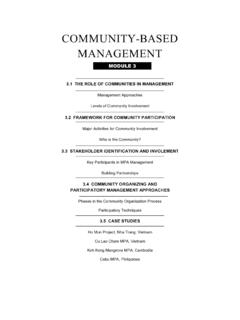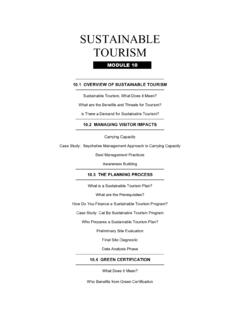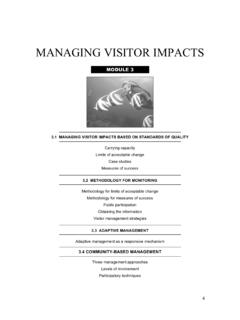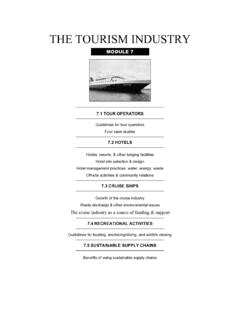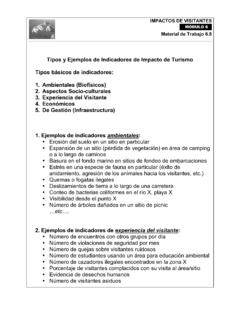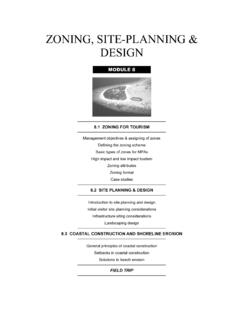Transcription of Some BENEFITS of tourism for local communities
1 STAKEHOLDER PARTICIPATION. MODULE 5. Handout Some BENEFITS of tourism for local communities : 1. Sustainable income - tourism can provide employment directly to residents, or can fund local activities through dissemination of revenue via the MPA. Revenue may come from the same sources listed previously - access fees, concessions in the MPA, etc. - and also from tourist spending outside of the MPA, such as for lodging, food and handicrafts. However, it is important that the community not become over-dependent on tourism . Overdependence can erode cultural values and will make the community vulnerable to fluctuations in tourism demand. In addition, local residents should not be led to expect unrealistic levels of employment. Sustainable tourism will generally not be an economic bonanza for an entire community, but will simply generate some jobs for a portion of the community. Many of these jobs will be part-time or seasonal.
2 2. Improved local services - New income from within or outside the MPA can also improve health and education services. In addition to a general increase in funding across the whole community, sustainable tourism activities also can be planned to fund specific local projects, such as building a new health clinic, or funding an on- going school program. 3. Cultural empowerment and cultural exchange - Tourists enjoy meeting local people and learning from traditional cultures. Community participation adds considerable value to a sustainable tourism program, and at the same time, traditional communities often feel greater self-esteem as a result of respectful interest shown by outsiders. However, the success of such visits depends on local residents being in control of the process and the situation. Language skills will also be essential to this endeavor. 4. local community awareness of conservation - It is common for people to not fully appreciate their surroundings, and to take what they have for granted.
3 Often, it is outsiders who take a fresh look and add value to our resources. Although rural residents who have grown up among spectacular coastal areas generally understand the intricacies and value its role in their lives, many have little idea of the global importance of their natural and cultural resources until the arrival of international nature tourists, who are often highly enthusiastic about the local areas and communities . As a result, local communities may feel a sense of growing appreciation and pride, which often increases local conservation efforts. Many residents become motivated to protect their areas and may change their pattern of resource use. For example, litter on beaches may be cleaned up, and water quality better managed. STAKEHOLDER PARTICIPATION. MODULE 5. Handout Some THREATS of tourism for local communities : 1. Environmental impacts from excessive numbers of visitors may disrupt the local environment.
4 2. Economic instability may make communities vulnerable to fluctuations in tourism demand. In addition, price increases may occur when visitors and local residents want the same goods and services, including groceries, gasoline, restaurants, and real estate. 3. Crowding of the town, beaches, etc. can disrupt the peacefulness of the natural environment (the MPA) and also the nearby town. This negatively affects both the local residents as well as the tourists. 4. Excessive development may disrupt local communities . Development occurs in two arenas: planned tourist-related development (resorts, hotels, piers, etc.), and un- planned development by locals in poor areas, due to an influx of people seeking jobs in the tourist industry. Unplanned local development often takes authorities by surprise and can overwhelm water, sewage, and public transport infrastructure. Regions with dense concentrations of resorts may become surrounded by shantytowns that have poor living quality for residents and also stress the local environment, for example in Cancun, Mexico, and Rio de Janeiro, Brazil.
5 5. Outside control - Outsiders may take too much control of tourist areas. This is a subjective judgment but is a real concern. Outside developers have financial resources and years of experience, and can squeeze out locals from the tourism market or push them into only a supporting role. communities may resent tourism if they feel they have little control over it. 5. Economic leakage - tourism revenue may leak out of the area if tourists buy international goods and patronize internationally-owned businesses instead of locally produced goods and services. Some economic leakage is normal, but it must be limited. Fortunately, tourists are usually eager to support local businesses if they are given the opportunity - and if the quality of local goods and services is good. 6. Cultural change - Cultural changes caused by tourism can be positive or negative, but either way, it usually occurs without the opportunity for communities to decide whether they actually want change.
6 Some outsiders may not want indigenous populations to change; others may see them as new markets to influence. Indigenous peoples themselves may have mixed desires, such as wanting to modernize their cultures, wanting to retain traditional ways of life, or simply wanting to make a decent living, whatever changes that requires.
